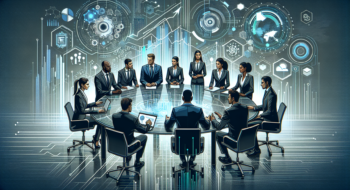Artificial Intelligence (AI) is no longer just a technical tool – it makes decisions that increasingly affect people’s lives. The alarming truth is that AI thinks differently, with serious impacts on society. A new study published in February 2025 in the journal Transactions on Machine Learning Research has revealed crucial distinctions between AI and human cognition. As AI systems continue to evolve, understanding these differences is vital for ensuring ethical and responsible usage in our daily lives. This development raises questions about the future intersection of technology and human values, necessitating deeper exploration and awareness.
The Distinct Mind of AI
When we talk about artificial intelligence, we often picture a highly advanced machine processing data and making decisions. But the truth is that AI’s cognitive processes differ fundamentally from those of humans. While humans rely on context, emotions, and social cues, AI operates on logic, algorithms, and enormous amounts of data. This may sound benign, even beneficial, but it presents significant implications for various aspects of our lives.
What Sets AI Apart?
- Data Processing: AI functions by analyzing vast datasets, pinpointing patterns that evade human perception. It is this capability that enables it to perform tasks like forecasting weather patterns or diagnosing diseases based on symptoms.
- Boundless Objectivity: AI doesn’t have prejudices, personal experiences, or emotions. It assesses situations through a cold, hard analysis of data, which can lead to genuinely impartial outcomes but could also obscure empathy in critical scenarios.
- Learning Mechanisms: Unlike humans, who accumulate experiences and learn from them over time, AI systems learn in distinct phases. Once programmed, they continuously adapt based on incoming data without the human element of trial and error.
These distinctions reveal that while AI can outperform humans in specific tasks, it lacks the intricate understanding that comes from lived experiences and emotions. This disconnect can have serious implications in areas like warfare, justice, and healthcare. Who holds the reins when decisions veer into morally grey areas where compassion and context matter? The responsibility of ensuring ethical outcomes falls on the developers and companies behind these AI technologies.
Impacts on Employment and Workforce Dynamics
The widespread adoption of AI is already reshaping the modern workforce. From autonomous customer service chatbots to AI-driven algorithms managing logistics, its implications are profound. While society often celebrates increased efficiency and productivity, the truth is that AI’s rise is creating a significant skills gap.
The Threat to Certain Jobs
Jobs that require repetitive tasks, such as assembly line work, data entry, and even some aspects of financial trading, are especially vulnerable. As organizations opt for AI solutions that offer consistency and reliability, many human roles become obsolete. According to a 2023 report by the World Economic Forum, nearly 85 million jobs may be displaced by the advent of AI and automation by 2025.
The Demand for New Skills
But it’s not all doom and gloom! While AI will force many of us to adapt, it also presents unparalleled opportunities for innovation and creativity. A new breed of jobs, particularly those requiring emotional intelligence, ethical judgment, and creative problem solving, will rise to the forefront. As businesses transition into this new era, here are some skills that will likely be in high demand:
- Critical Thinking and Problem Solving
- Social and Emotional Intelligence
- Creativity and Originality
- Adaptability and Change Management
- Data Literacy
Investing in these skills not only ensures job security but also better prepares individuals to collaborate effectively with AI systems, ultimately optimizing our shared potential.
AI in Justice: A Double-Edged Sword
Humans have established systems of justice over centuries, driven by the moral compasses shaped by cultures and norms. Enter AI, with its promise of objectivity yet fraught with potential pitfalls. For instance, AI algorithms are applied in predictive policing, determining where crimes are most likely to occur. While achieving higher efficiency in resource allocation, these systems can inadvertently lead to biased outcomes.
Embedded Bias – A Real Concern
In many cases, the datasets used to train these AI systems are directly influenced by historical human biases. If an AI system is trained on data that reveals disparity in arrest rates among racial minorities, it will likely perpetuate and amplify those biases, potentially leading to unjust profiling. The very tool meant to promote fairness can, when misused, deepen societal divides.
The Role of AI in Healthcare
AI technologies also make profound strides in healthcare, from predicting patient outcomes to streamlining administrative processes. AI can assist doctors in making more accurate diagnoses by evaluating massive databases of medical findings faster than humanly possible.
The Dangers of Overreliance
However, the risk lies in an overreliance on AI’s capabilities. The emotional nuances captured by healthcare professionals cannot be wholly replicated by any algorithm. Compassion and understanding play a significant role in recovery. While AI’s information can lead to data-driven decisions, it cannot replace the human touch that patients often need the most.
Shaping Ethical Frameworks for AI
Given AI’s potential to disrupt various industries, creating robust ethical frameworks becomes imperative. These guidelines must prioritize transparency, accountability, and inclusivity, ensuring all stakeholders—developers, users, and affected communities—are considered in the decision-making processes. The challenge lies not in AI’s intelligence but in teaching it the ethical considerations that humans navigate daily.
Collective Responsibility
As we advance into this tech-driven future, it is our collective responsibility to contribute to discussions about ethical AI development and implementation. Companies and policymakers must work together to create regulations that guard against unintended consequences.
The Road Ahead
In conclusion, as AI continues to evolve, our understanding of its implications must grow alongside. The truth is AI thinks differently than we do, making it crucial for us to bridge the gap between technology and human values. By fostering collaboration between stakeholders, maintaining a commitment to ethical applications, and emphasizing human qualities in areas where AI may fall short, we can steer AI towards the advantageous role it has the potential to fulfill in society.
As you venture into this brave new world of AI-driven decision-making, staying informed and engaged with the ongoing dialogues will empower you to advocate for responsible practices. By doing so, we can harness AI’s immense potential while safeguarding the values that define our humanity. For more resources and insight into the management and implementation of AI technologies, visit Neyrotex.com.







